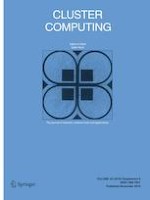30.01.2018
Evaluation of neighbor credit value based AODV routing algorithms for selfish node behavior detection
Erschienen in: Cluster Computing | Sonderheft 6/2019
EinloggenAktivieren Sie unsere intelligente Suche, um passende Fachinhalte oder Patente zu finden.
Wählen Sie Textabschnitte aus um mit Künstlicher Intelligenz passenden Patente zu finden. powered by
Markieren Sie Textabschnitte, um KI-gestützt weitere passende Inhalte zu finden. powered by
